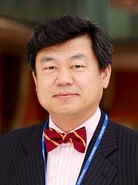Meeting
2014 Gastrointestinal Cancers Symposium

Department of Gastroenterology, University of Ulsan College of Medicine, Asan Medical Center, Seoul, South Korea
Hwoon-Yong Jung , Eun-Jeong Gong , Ji Yong Ahn , Hyun Lim , Kwi-Sook Choi , Jeong Hoon Lee , Do Hoon Kim , Kee Don Choi , Ho June Song , Gin Hyug Lee , Jin-Ho Kim , Son Yeong Choi , Jaewon Choe , Min-Ju Kim
Background: A customized screening program for gastric cancer would optimize the benefits of screening endoscopy. This study investigated the risk factors for gastric cancer detected during screening, and factors affecting clinical outcomes. Methods: From April 2000 to December 2010, subjects who underwent screening endoscopy at Asan Medical Center were included. To investigate risk factors, age and sex-matched control group were selected.The clinical outcomes of gastric cancer identified during screening (screening group) were compared with age, sex and date of diagnosis-matched subjects who were diagnosed with gastric cancer in the outpatient clinic (outpatient group). Results: Of 109,530 subjects, 327 were diagnosed with gastric cancer. The median age of the screening group was 63.6 years (interquartile range: 56-71 years), and the male to female ratio was 2.4:1. When comparing with the control group, H. pylori seropositivity (odds ratio [OR] 2.933, p<0.001), carcinoembryonic antigen (OR 8.633, p=0.004), family history of gastric cancer (OR 2.254, p=0.007), and drinking (OR 3.312, p<0.001) were independent positive risk factors, and the use of aspirin a negative risk factor for gastric cancer (OR 0.445, p=0.012) in multivariate analysis. Low density lipoprotein cholesterol (hazard ratio [HR] 0.987, p=0.005), cancer antigen 19-9 (HR 21.713, p<0.001), resectability (HR 59.833, p<0.001), and family history (HR 0.308, p=0.009) were independent risk factors for death. The 5-year survival rate was significantly higher in the screening group than in the outpatient group (p<0.001). Conclusions: Early detection of gastric cancer by screening endoscopy while asymptomatic enhances patient outcomes, especially in high risk groups.
Disclaimer
This material on this page is ©2024 American Society of Clinical Oncology, all rights reserved. Licensing available upon request. For more information, please contact licensing@asco.org
2014 Gastrointestinal Cancers Symposium
Poster Session
General Poster Session A: Cancers of the Esophagus and Stomach
Cancers of the Esophagus and Stomach
Prevention, Diagnosis, and Screening
J Clin Oncol 32, 2014 (suppl 3; abstr 8)
10.1200/jco.2014.32.3_suppl.8
8
A18
Abstract Disclosures
2018 Gastrointestinal Cancers Symposium
First Author: Haejin In
2024 ASCO Gastrointestinal Cancers Symposium
First Author: Alejandro Nieto Dominguez
2024 ASCO Gastrointestinal Cancers Symposium
First Author: Jong-Jae Park
2023 ASCO Annual Meeting
First Author: Ram Prakash Thirugnanasambandam